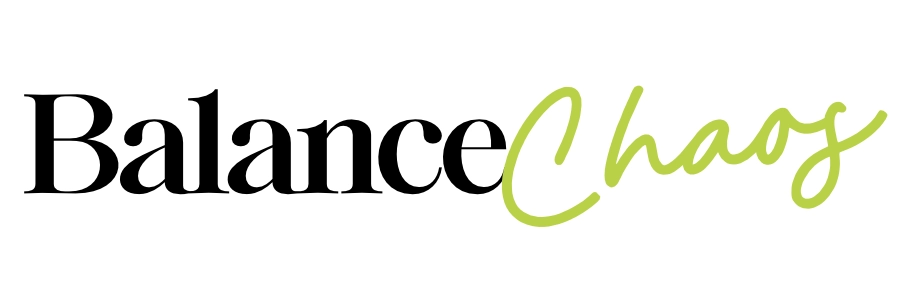It is not healthy to be obsessed with eating healthy.
With social media, and the focus on all the “toxic” ingredients you need to avoid, it can feel like eating “clean” and carefully reading ingredient labels is the only way to eat if you care about your health. So, can you take it too far? Yes, healthy eating can go too far. There is an eating disorder where someone is obsessed with healthy eating.
It’s called orthorexia. And while it’s not actually a clinical diagnosis, it can be just as dangerous and life-threatening as anorexia.
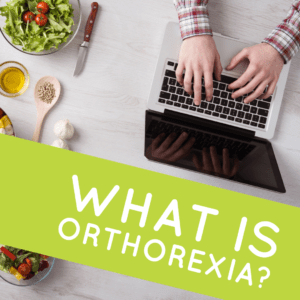
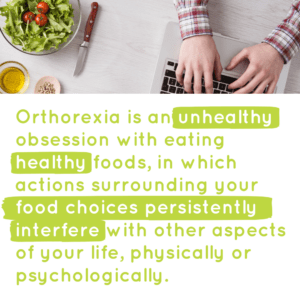
What is orthorexia?
Orthorexia is an unhealthy obsession with eating “healthy” foods, in which actions surrounding your food choices persistently interfere with other aspects of your life, physically or psychologically.
How do I know if I have orthorexia?
As I mentioned, orthorexia is not a clinical diagnosis. There is no DSM 5 criteria (diagnostic criteria that your therapist or mental health provider uses to make a mental health diagnosis) for orthorexia that gives a diagnosis of an eating disorder and assigns urgency for you to seek treatment.
You do not need to be diagnosed with any eating disorder before you seek treatment to improve your relationship with food and your body! Now is the time to seek a fuller life outside of obsession with healthy eating, obsession over food choices, calorie tracking, controlling your weight or body composition, or always choosing the most moral, ethical, and nutritious foods.
You can use the Bratman self-test as a guide if you think that you are just a little too obsessed with eating healthy.
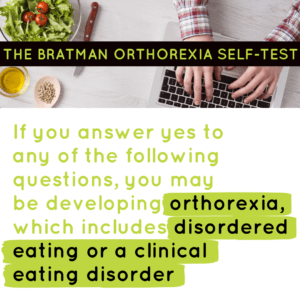
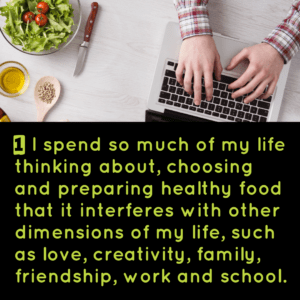
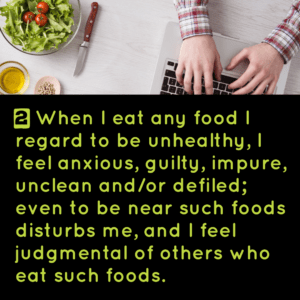
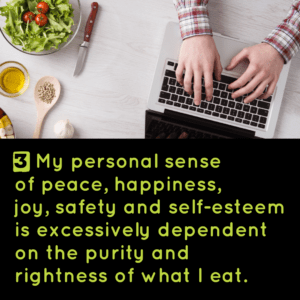
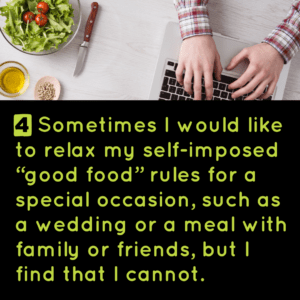
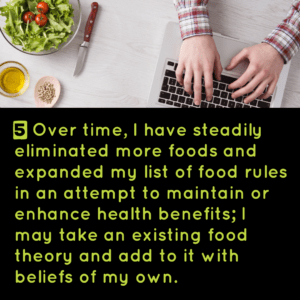
Do you think you or someone you love has an eating disorder and/or is obsessed with eating healthy? My number one factor for determining whether you have an unhealthy relationship with food is to ask:
In what ways do my food choices interfere with different dimensions of my life?
Some red flags…
- Have you ever had a fight with a friend or family member or had a breakdown about food choices at a meal or holiday?
- Do you bring your own meals to parties?
- Do you impose your strict food rules on others or feel that you are superior to others due to your food choices?
- Do you spend most of your day planning your food, logging your food, thinking about food, or checking your body size/shape?
Those are some major red flags that your food rules are controlling your life. Of course, there may be some exceptions, for example if you have a severe food allergy. That being said, even a life-threatening food allergy should not control your life. I encourage anyone with food allergies to work with an allergist and a dietitian to become more confident and autonomous, instead of letting that food allergy dictate your life and cause persistent fear. Seek help for your eating disorder and/or if you think you are obsessed with healthy eating!
But I don’t care as much about health as I do the environment and/or animal welfare.
What if you don’t just have an obsession with healthy eating? What if you have environmental or animal welfare reasons for choosing foods? Those ideas can absolutely be roped up into an eating disorder. We tend to think, if it’s not about weight loss and body size, it’s not an eating disorder. But if you go through the Bratman self-test and replace “healthy” with “environmentally-friendly” or “animal-friendly” and you answer yes to one or more of these questions? It may be time for you to start relaxing your food rules and seek some help.
I’m obsessed with eating healthy & I think I need help. Where do I start?
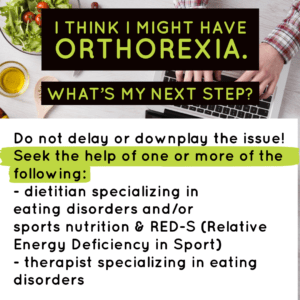
Seek the help of a dietitian who can help you expand your food choices and has the philosophy that “all foods fit.” Your best bet is a dietitian who specializes in eating disorders. If you just reach out to any dietitian, it’s possible that they will collude with your eating disorder! Unfortunately, some dietitians have disordered relationships with food themselves. (Think about it, why did many of us decide to study food so intensely?)
If you are an athlete, it can be helpful to work with a sports dietitian who has experience working with eating disorders and Relative Energy Deficiency in Sports – RED-S (formerly the female athlete triad, we now know that under-fueling has drastic consequences for male and female athletes).
Want to live a more full & vibrant life by balancing your chaos and developing a healthy relationship with food? Book an initial consult with me!
What’s it like to work with me? Read more here.
